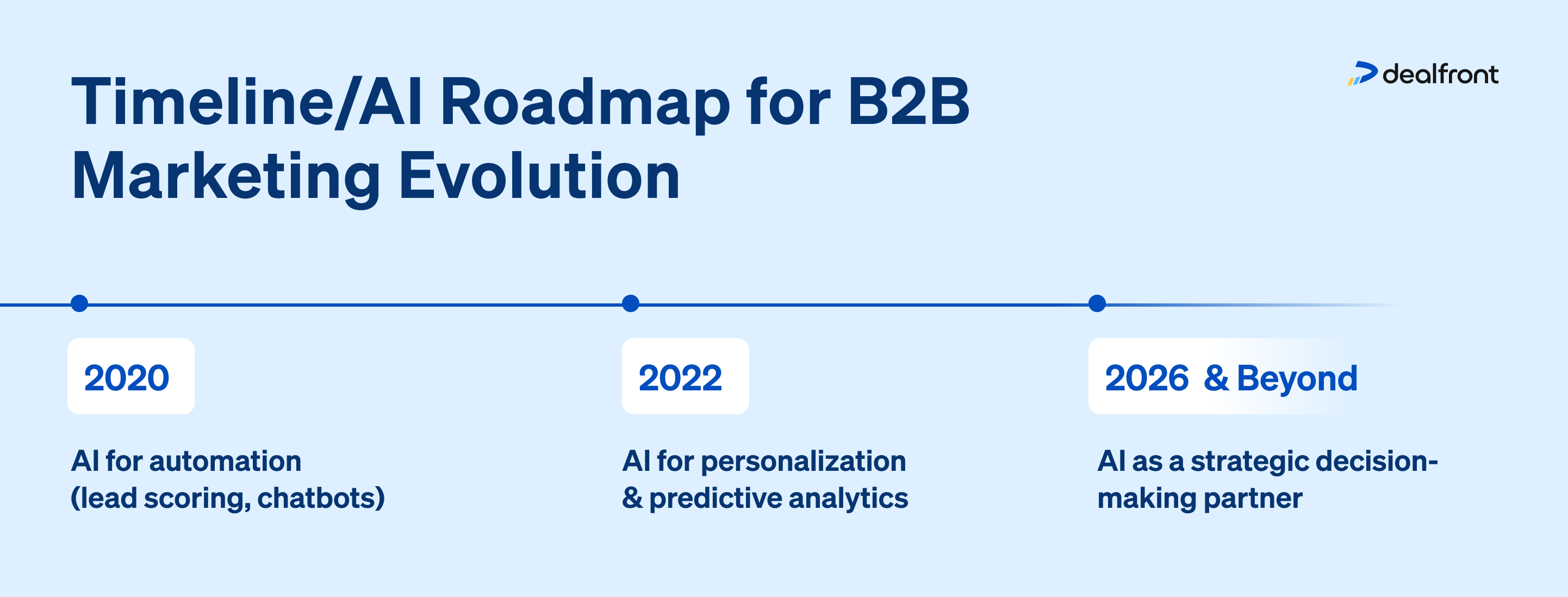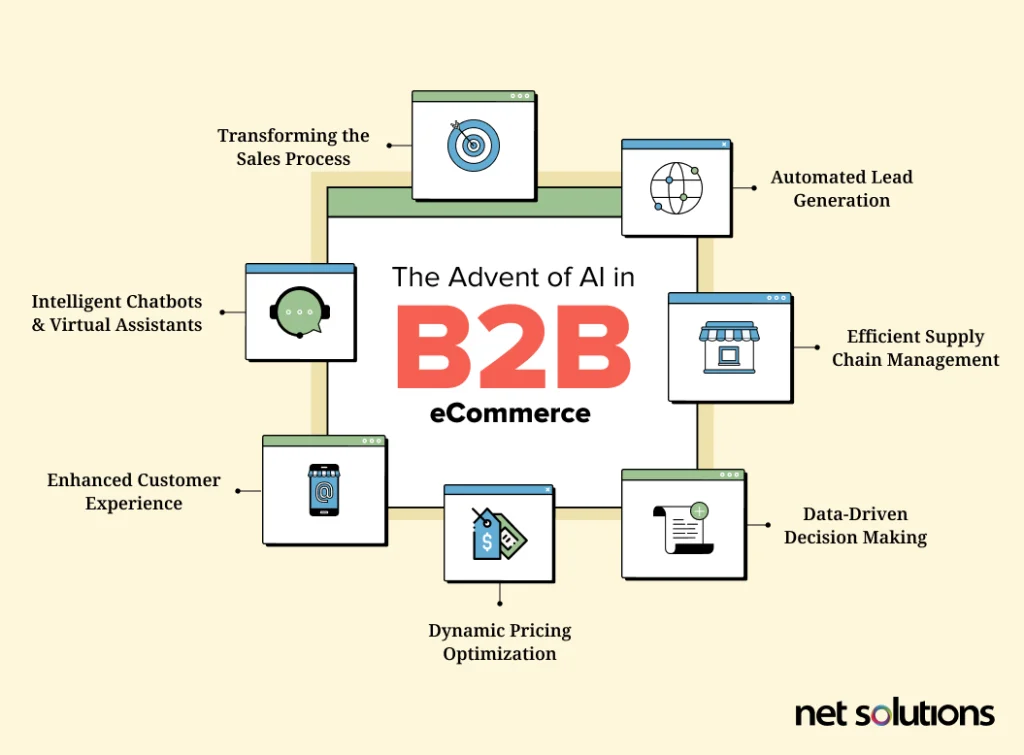AI Automation for B2B: Approaches to Improve Your Service Performance
AI automation in the B2B market presents a pivotal chance for companies to enhance their efficiency. By improving and enhancing processes decision-making, services can achieve substantial effectiveness. The successful assimilation of AI requires cautious consideration of numerous factors. Comprehending which locations to automate and picking ideal devices are simply the start. The potential for improvement increases critical inquiries regarding application and recurring examination. What strategies will ensure long lasting success in this evolving landscape?
Understanding AI Automation in B2B Context
As companies progressively look for efficiency and innovation, comprehending AI automation in the B2B context comes to be vital. AI automation leverages advanced technologies to simplify processes, enhance decision-making, and improve general performance. By incorporating AI devices, firms can optimize procedures such as supply chain management, client relationship management, and information analysis. These innovations can examine large amounts of data rapidly, supplying workable insights that drive tactical initiatives. Additionally, AI-driven automation reduces human error and releases up staff members to concentrate on more facility tasks. By promoting cooperation between human knowledge and device capacities, companies can attain a competitive side. Inevitably, comprehending AI automation is crucial for B2B companies intending to prosper in an increasingly digital market.
Determining Areas for Automation
In the mission for effective AI automation in B2B, it is vital to identify specific areas where automation can yield substantial advantages. This includes evaluating job monotone, exploring opportunities for information processing, and determining process bottlenecks. By concentrating on these aspects, organizations can improve operations and boost performance.
Task Monotone Assessment
Task repetitiveness analysis plays an essential function in determining locations ripe for automation within B2B operations. This procedure involves examining daily jobs to figure out which are taxing and repeated, therefore hindering productivity. By scrutinizing workflows, services can determine certain functions that require extreme hands-on input, such as data entry, invoice processing, or client follow-ups. Acknowledging these repetitive jobs permits organizations to allot sources extra successfully, improving general effectiveness (Growth Systems For B2B). Additionally, automation can lessen human error, simplify operations, and free up workers to concentrate on higher-value tasks. Carrying out a complete task repetitiveness assessment encourages B2B organizations to adopt targeted automation approaches, eventually driving boosted efficiency and affordable advantage in the market
Data Handling Opportunities
Countless data handling chances exist within B2B companies, presenting considerable possibility for automation. These chances usually occur in areas such as data entry, invoice processing, and customer partnership administration. By automating information collection and recognition procedures, companies can lower human error and enhance effectiveness. Additionally, automating report generation permits groups to access real-time understandings, fostering prompt decision-making. Supply management systems can also benefit from automation, simplifying supply monitoring and order handling. Leveraging AI in data analytics enables organizations to discover fads and patterns that might or else go undetected. Eventually, welcoming automation in these locations not just optimizes operations yet also maximizes important resources, permitting employees to concentrate on critical efforts that drive growth.
Process Bottleneck Recognition
Determining process traffic jams is a vital action in understanding the complete advantages of automation within B2B organizations. These traffic jams commonly materialize as hold-ups, resource restraints, or ineffective procedures that impede efficiency. To efficiently pinpoint these locations, companies can conduct detailed analyses of their workflows, using metrics such as cycle time and throughput. Engaging staff members in discussions concerning pain factors can also provide valuable insights. Companies can prioritize them based on impact and usefulness for automation when traffic jams are recognized. By strategically dealing with these inefficiencies, B2B companies can streamline operations, enhance collaboration, and inevitably enhance general performance. This aggressive method to process assessment lays the foundation for successful automation campaigns that drive organization development.
Picking the Right AI Devices and Technologies
As organizations increasingly transform to AI to improve their operations, picking the right devices and technologies ends up being important for achieving desired end results. Organizations must examine their details requirements and goals, considering variables such as compatibility, scalability, and user-friendliness. A thorough market evaluation can aid determine leading AI services customized for their industry. In addition, businesses should assess the technical facilities called for to support these devices, making sure smooth integration with existing systems. Data protection and conformity with guidelines are likewise vital factors to consider that affect device selection. By concentrating on these criteria, business can make enlightened decisions that drive efficiency and productivity, eventually resulting in improved organization efficiency. The right AI tools encourage organizations to innovate and maintain an one-upmanship out there.
Developing a Critical Execution Plan
An effective critical execution prepare for AI automation in B2B requires plainly defined essential goals. Minarik AI. Additionally, organizations have to assess their current abilities to identify gaps and opportunities for renovation. Constant surveillance and adjustment of the technique will certainly ensure placement with evolving business needs and modern technology advancements
Specify Key Purposes
To guarantee successful AI automation in B2B environments, specifying essential goals is vital for developing a critical implementation plan. Organizations has to determine particular, measurable objectives that align with their overall business approach. This clarity gives a roadmap for the automation procedure, ensuring that initiatives are concentrated on areas that will certainly yield the highest effect. Key goals may consist of boosting operational effectiveness, improving customer satisfaction, or raising revenue. Establishing these objectives makes it possible for groups to prioritize resources successfully and track progression with time. Additionally, clear goals help with far better interaction amongst stakeholders, fostering cooperation and placement throughout the company. Eventually, distinct objectives function as the foundation for a robust AI automation technique that drives business efficiency.
Examine Current Capabilities

Display and Change
Implementing AI automation needs a dynamic strategy that emphasizes constant monitoring and adjustment - Minarik AI. Services need to develop a critical application strategy that incorporates normal evaluations of AI efficiency versus predefined metrics. This entails monitoring vital performance signs (KPIs) to assess the performance of automation remedies. By evaluating data, organizations can identify areas for renovation and fine-tune their AI systems appropriately. Engaging with stakeholders throughout the procedure ensures that the automation lines up with company objectives and individual requirements. In addition, fostering a culture of flexibility allows business to respond promptly to altering market problems and technological advancements. Inevitably, recurring monitoring and modification not only improve operational effectiveness but additionally drive continual business performance in the competitive B2B landscape
Ensuring Information High Quality and Assimilation
As organizations increasingly rely upon AI automation in B2B processes, making sure information high quality and integration comes to be crucial for success. Top notch information is important for exact analytics, informed decision-making, and effective customer engagement. Information have to be cleaned, standard, and confirmed to eliminate errors and disparities that can bring about misguided understandings. In addition, smooth combination throughout various platforms and systems is necessary; inconsonant data silos impede automation efforts and minimize operational efficiency. Organizations ought to take on durable data administration frameworks and make use of advanced tools to help with information integration while preserving high quality standards. By prioritizing these elements, services can enhance their AI automation initiatives, inevitably causing improved efficiency and a competitive advantage in the B2B landscape.
Gauging Success and ROI of AI Initiatives
How can companies properly gauge the success and roi (ROI) of their AI campaigns? To determine performance, companies must establish clear, measurable objectives straightened with strategic goals. Key performance indications (KPIs) such as cost savings, revenue development, and efficiency renovations can give useful understandings. Organizations usually perform baseline assessments prior to executing AI, allowing them to contrast pre- and post-implementation metrics. In addition, analyzing client complete satisfaction and engagement can disclose the effect of AI on user experience. Routinely assessing these metrics assists in refining AI techniques and making certain positioning with service goals. By employing an organized method to dimension and assessment, companies can accurately examine the performance of their AI campaigns and make notified decisions regarding future financial investments.
Conquering Difficulties in AI Adoption

Often Asked Inquiries
How Can AI Automation Improve Customer Partnership Monitoring in B2B?
AI automation can improve customer connection administration in B2B by improving communication, offering personalized communications, assessing consumer data for insights, automating follow-ups, and boosting action times, ultimately promoting stronger connections and driving sales growth.
What Industries Benefit The Majority Of From AI Automation in B2B?
Manufacturing, money, medical care, and logistics markets benefit most from AI automation in B2B. These fields leverage automation to improve processes, enhance data evaluation, enhance consumer interactions, and ultimately increase operational efficiency and profitability.
How Does AI Automation Impact Worker Responsibility in B2B Business?
AI automation transforms staff member duties in B2B firms by improving tasks, decreasing repetitive job, and allowing team to concentrate on critical initiatives. This shift boosts productivity and fosters a society of development and adaptability.
What Are the Expenses Connected With Implementing AI Automation?
The costs connected with implementing AI automation include preliminary software procurement, framework upgrades, training costs, continuous upkeep, and prospective combination obstacles. Minarik AI. Firms need to likewise take into consideration long-lasting functional shifts and staff member adjustment costs in their economic preparation
How Can Services Ensure Ethical AI Usage in Their Procedures?
Services can assure honest AI use by developing clear guidelines, promoting openness, performing normal audits, entailing varied stakeholders, and prioritizing information privacy. Continual training and awareness programs additionally boost understanding and adherence to honest techniques.
As companies progressively look for performance and innovation, comprehending AI automation in the B2B context becomes essential. In the quest for effective AI automation in B2B, it is vital to recognize details locations where automation can generate considerable benefits. A successful tactical application plan for AI automation in B2B calls for plainly defined vital purposes. To guarantee successful AI automation in B2B settings, specifying crucial purposes is essential for creating a calculated execution plan. As companies significantly depend on AI automation in B2B processes, ensuring data quality and integration comes to be crucial for success.